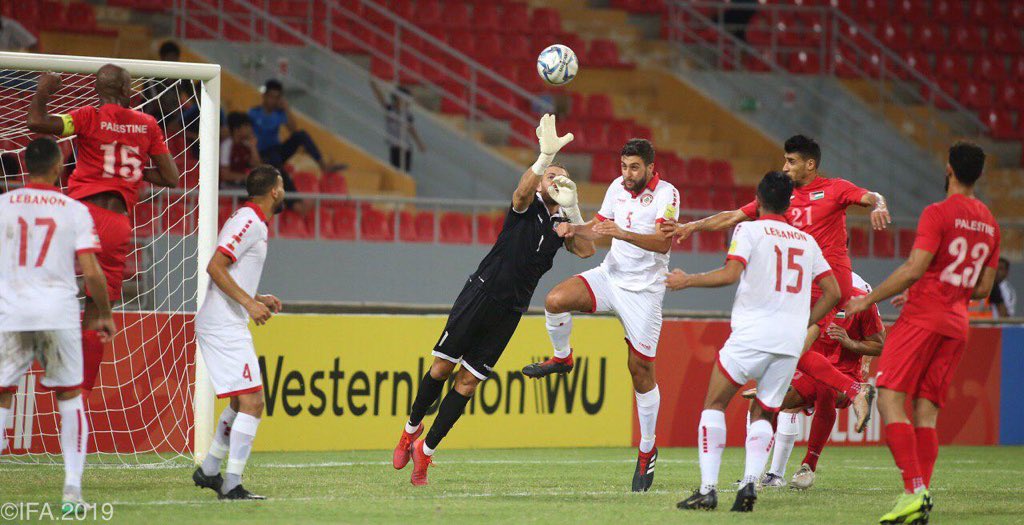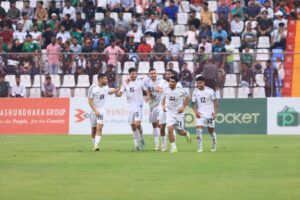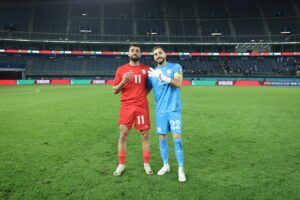What: 2026 World Cup Qualifier
When: Thursday, November 16th, 2023
Where: Sharjah Stadium, United Arab Emirates
Kickoff: 16:00 Jerusalem Time
TV: Our Substack subscribers will receive an email with a link to a live stream on the day of the game. Subscribe here.
Previous Encounters:
05.08.2019// Lebanon 0:0 Palestine (2019 WAFF Championship)
10.11.2016 // Lebanon 1:1 Palestine (Friendly)
31.08.2015 // Lebanon 0:0 Palestine (Friendly)
11.12.2012 // Palestine 1:0 Lebanon (2012 WAFF Championship)
20.07.1998 // Lebanon 3:1 Palestine (1998 Arab Cup qualification)
A Derby highlighted by difficulties
When any two Arab countries play it is a derby. Meaning the gulf in quality is narrowed, passions run high, and the form book goes out the window. Palestine has become familiar with playing many countries in the region but matches against Lebanon have been somewhat elusive. The two countries met in Beirut 25 years ago in what was Palestine’s first FIFA sanctioned match. It would be 14 years before the two teams met again and since then the teams have met only three additional times. Not once have the two teams met in World Cup or Asian Cup qualifying matches.
Palestine has faced nearly every other West Asian nation more times. This might be a derby but it is not a rivalry. In fact I would venture to say there is real disappointment amongst the fan bases that one will most likely eliminate any realistic chances of the other progressing.
The sentiment given the horrendous situation in Palestine, where more than 11,000 people have died and millions have been displaced, is that there are far more important things than football. Lebanon of course has also been affected by the war as well. Israel has bombed Lebanon several times; killing a journalist and a woman and her three daughters on separate occasions.
Lebanon is still in a severe economic crisis that has resulted in all football stadia in the country being deemed unusable by the Asian Football Confederation. That judgement is what led to The Cedars opting to host this game in the United Arab Emirates. There is hope that come March 2024, a stadium in Beirut, Tripoli, or Sidon will meet the requirements to host matches. It was also decided by that the team will play in Sharjah on Thursday without supporters as a punishment for fan misbehavior in their last match of 2022 World Cup qualification
A Golden Decade for Lebanese & Palestinian Football
The last ten years can be regarded as something of a golden era for football in both Levantine nations. Lebanon qualified for the Third Round of World Cup qualification for the 2014 and 2022 editions of the World Cup. They also achieved their first ever successful qualifications for the 2019 and 2023 Asian Cups during that time span. A list of Lebanon’s most famous matches would surely include their scalps of UAE, Kuwait, Iran, and South Korea in the 2014 World Cup qualifying cycle. Their all time best XI would include the captain of that team- Roda Antar as well as the captain of the current team- Hassan Maatouk.
The question for Lebanon is what comes next and whether or not the team has already peaked. Moving on from the Ivan Hasek era was meant to signal the start of something new.
Aleksandar Ilic brought new ideas- unfortunately those ideas were disastrous and he regularly fielded lineups with players playing out of position. The goals did not flow even against the likes of Vanuatu and Mongolia. Lebanon fell out of Pot 2 and landed in Pot 3 on the back end of these results and a decision was made to part ways with Ilic.
Nikola Juricevic took charge of the team in October and the former Azerbaijan boss delivered a pair of losses to Montenegro (3-2) and UAE (2-1).
For Palestine, the past ten years were kicked off with a successful qualification to the 2015 Asian Cup on May 30th, 2024. Jamal Mahmoud led this team through the doldrums of Asian football plotting a path from Nepal to the Maldives in the Challenge Cup path of qualifying.
The young guns of that generation are now the leaders of the team- Musab Al-Battat, Tamer Seyam, and Rami Hamadi serve as captains. While they have never successfully qualified for Round 3 of of Asian World Cup qualification you get the sense that Palestine are on an upwards trajectory with many of their best players playing important roles for their clubs in Europe and Asia.
Analysis
The most striking thing about the trajectory of the two teams is how different the makeup of their respective squads are. Lebanon have only three players based abroad in the squad Soony Saad, Majed Osman, and Jehad Ayoub who play in Malaysia and Indonesia, respectively.
The rest of the squad is based in Lebanon and there are many players well into their 30s that are expected to start. 36 year old captain Hassan Maatouk, chief amongst them. The average age of Lebanon’s starting XI in their last match was 29.9 years old. The average age of the squad called up in 29.2. Half the starting lineup is expected to be made up of players over the age of 30.
Palestine on the other hand, fielded a starting XI with the average age of 27.2 in their last match. Only two projected starters are over the age of 30 and the average age of the squad stands at 26.8.
Juricevic has brought a degree of stability to Lebanon but they continue to be dogged by an inability to score from open play. All three goals of the Croat’s reign have come off of set pieces- two free kicks and a corner kick. Going back 15 matches, Lebanon has only managed 14 goals- half of those were scored against Vanuatu and Bhutan.
The team has also proven vulnerable to set piece play having conceded three of the five goals under Juricevic from corner and free kicks. Lebanon will line up in a 4-2-3-1 and will employ a sturdy mid-block in a 4-4-2 shape whilst out of possession.
Palestine will most likely revert to a 4-3-3. If Lebanon are to be successful they will need to find a way to stop Al-Battat’s overlapping runs on the right flank which are a constant source of danger while also disrupting the midfield duo of Ataa Jaber and Mohammed Rashid. If they’re able to do that then the forward line led by Oday Dabbagh will be cut off from the service it needs to be effective.
Palestine should have a slight advantage given its more talented personnel but will need to remain level headed and control the tempo of the match. Crisp possession and eliminating Lebanon’s ability to transition will be key to gaining all three points.
FP’s Prediction: This may be the first match of the group but it has the aura of an elimination match. As such, expect caution to reign supreme. If there is no early goal, this game could end 0-0 with the teams waiting until Match Day Five to settle their scores.




